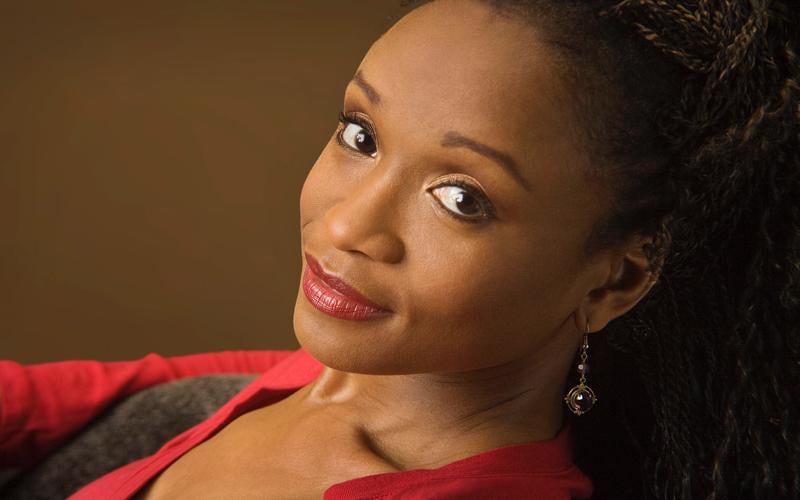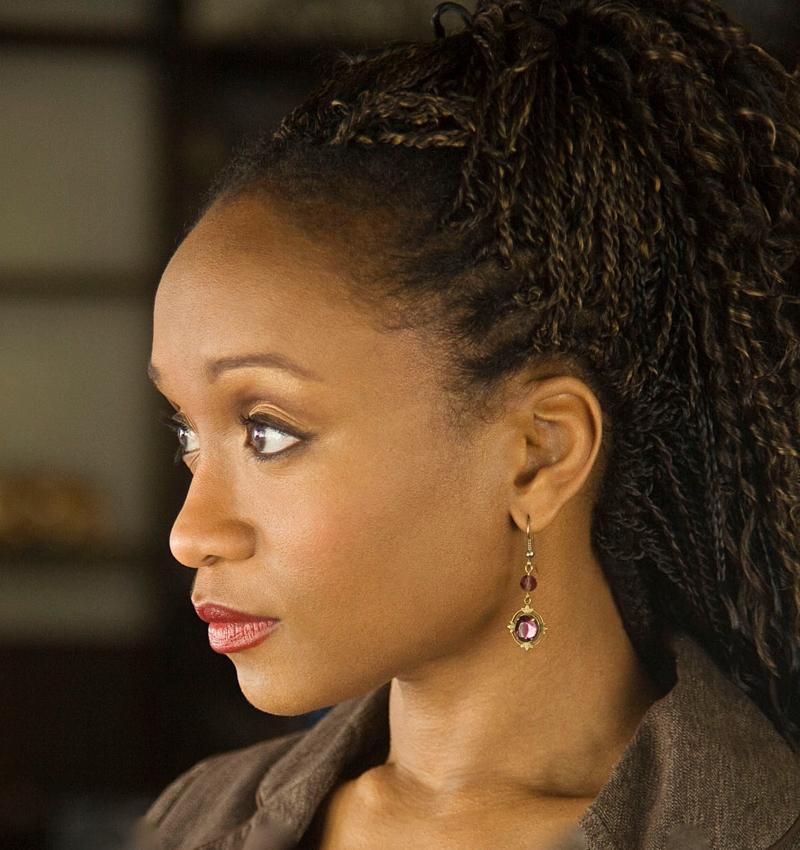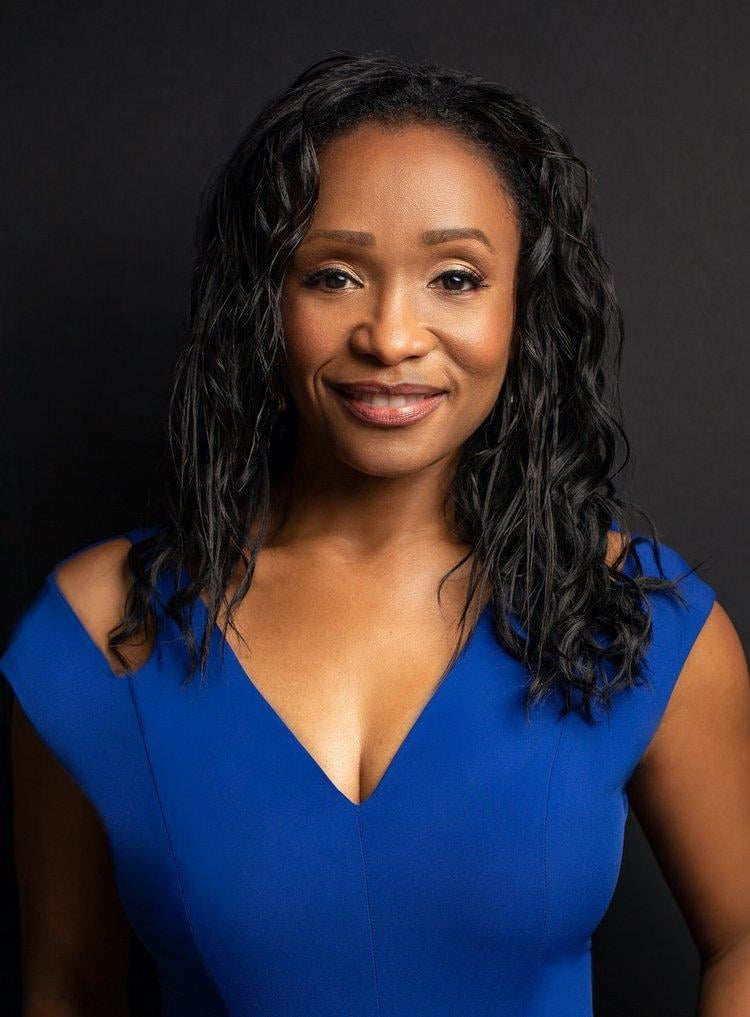
Soprano Shawnette Sulker’s schedule might cause you to suck in your breath a little. She just sang Samuel Barber’s Knoxville: Summer of 1915 with Mission Chamber Orchestra of San Jose, and she’s currently playing the Queen of the Night in Mozart’s The Magic Flute with Livermore Valley Opera (there are still two performances left, March 9–10). Then, she’ll make her debut for Music at Kohl Mansion on March 17 with the Poulenc Trio in chansons by Francis Poulenc.
Is she taking some time off after that? No, she’s not. April 5–7, she’ll be in Opera Parallèle’s Birds & Balls, two one-act comedic operas. The first, Vinkensport, is inspired by the Flemish sport of finch sitting, while the second dramatizes the 1973 tennis game between Billie Jean King and Bobby Riggs, popularly called the “Battle of the Sexes.” Sulker spoke to SF Classical Voice about how a teacher at Vermont’s Bennington College sparked her love of opera, why the Queen of the Night is one of her favorite roles, and how she’s excited to sing with the unusual trio of bassoon, oboe, and piano.
How did you start singing?
I pretty much started in college. I was in high school chorus. There was one in my school, and then I grew up in Brooklyn, and there was something called All-City High School Chorus, and you had kids from all different high schools. I did that for, I think, a year. We had to audition for it, and I was very scared, I remember. That was all the training I’d had — if you could call that training — before I went to college, but I always loved singing. I was always singing to the radio, and I learned how to play guitar really badly, and I wrote really bad songs that at the time I thought were brilliant and transformative. I found some a few years ago, and I listened, and I thought, “Oh my god.” It was so cringy, very angsty, and very — I would say, I don’t know — full of it. [Laughs.]
When I went to undergrad, I wanted to go to a school that had a music program, and I wanted to go to a small school. I started taking voice lessons, and my teacher was a classically trained soprano. She just started assigning me simple arias, and I started learning them, and I loved it. One of my jobs on campus was in the music library, so I spent a lot of time listening once I got the bug.

You say you loved singing arias. What was it you loved about them?
It was challenging, first of all, singing in different languages, and I just thought the music was beautiful. I had almost no exposure to classical music up until then, so it was just diving into this new genre that I knew nothing about. It just turned something on in me, I guess, singing in the different languages and the storytelling. It’s kind of a perfect art form because you get to sing and you get to act and you get to have the cool costume and you’re singing with amazing musicians and an orchestra. It’s just such a beautiful, collaborative art form. I think I just fell in love with the drama of it and the beauty of it.
Which composers do you love to sing?
Mozart’s great to sing. It fits my voice really well. I love singing Strauss. I love singing Schubert. Right now, I’m singing Barber’s Knoxville: Summer of 1915. That’s so gorgeous. I think some composers feel more in the pocket than others.
You sing both standards and newer work. Is there one you prefer?
I know a lot of people who specialize in Baroque or contemporary opera. I love singing it all because, to me, they all have something different to offer technically or expressively. I sing everything from Baroque to contemporary, the whole span, and everything offers a different challenge. You use your voice differently, and I really enjoy that.
I read you said the role of the Queen of the Night is one of your favorites. What makes it a favorite?
I love singing Mozart, and the queen is the perfect role because, in my opinion, she sings two of the best, most dramatic arias ever and you get a lot of bang for your buck with those arias. Then, she sings this ridiculous ensemble thing that feels like an afterthought, and that’s the whole role. [Laughs.] It’s two arias and a love song before she and her ladies are banished. It’s a super tiny role, and you spend a lot of time just hanging out backstage, doing crossword puzzles or whatever it is you do, and then you go and sing these amazing arias. You get to be this powerful woman who’s got a one-track vision of what she wants to accomplish, and she’ll do anything she can to get it done. Then, at the end, you come out for the curtain, and everyone remembers you even though you really didn’t do that much!
What is it you love about Knoxville: Summer of 1915?
I love the poetry [a text by James Agee]. I love the way that Barber sets it. It’s so nostalgic ... and it evokes the scene of what’s happening there — there are horses and buggies alongside autos on the street. It’s from the perspective of a young child, but the language is so sophisticated. It’s either this childhood genius, or more likely, it’s an adult thinking back to that time and putting adult words to those feelings of a summer evening and walking on the street, looking at what your neighbors are doing, people on their porches in their rocking chairs, and this feeling of being with family and being loved.
There’s one part where the child talks about how evening is upon them, and he’s with his mom, his dad, his uncle, and his aunt, and they spread a quilt on the lawn. They’re all lying there and talking but not talking about anything of significance, just being together and looking at the stars, and then it goes deeper at this point. The child says, “By some chance, here they are, all on this earth; and who shall ever tell the sorrow of being on this earth, lying, on quilts, on the grass, in a summer evening.” The child asks that God protect his family, and he’s scooped up and taken to bed. It’s just so beautiful. And the way that Barber sets it, it has that lilting, kind of rocking feel in the beginning, and then it moves into this more chaotic section, and then it shifts again. It’s just beautifully written. I love it, if you can’t tell. [Laughs.]

Tell me a little about Birds & Balls and what you’re doing with it.
Opera Parallèle is doing a double bill. One opera is called Birds, or Vinkensport, which is an obscure Flemish sport of finch sitting, where people have a finch in a box and they go out with their finches and sit in a row. They have a stick, and every time that the finch makes a certain song — as far as I understand it, anyway — they make a knot on this rod that they’re marking on the tally, and whoever sings that song the most wins. So that’s the whole thing, and someone wrote an opera about it. [Laughs.]
I’m playing Sir Elton John’s trainer. Sir Elton John is the name of a finch. Then, in the second opera, I’m playing Susan B. Anthony. Balls is about that “Battle of the Sexes” tennis match with Billie Jean King and Bobby Riggs. I’m singing that part, and I’m watching the match.
How did you end up singing with the Poulenc Trio?
The trio is not typical — they’re made up of piano, oboe, and bassoon, and they’re pretty renowned. ... Patricia Kristof Moy [executive director of Music at Kohl Mansion] had wanted to find something for me to do at Kohl Mansion, and she had the idea to have some Poulenc songs. So we had some Poulenc songs arranged for voice and that trio. They’re also doing something by Duke Ellington, and it’s a cool-sounding program. I’m excited because I’ve never sung with piano, bassoon, and oboe before. Zak [Grafilo] did the arrangements for us, so this has never been heard before. It’s really exciting to be able to collaborate with that set of musicians of such a high caliber.
Do you like singing so many different things and styles?
I do like singing a lot of different things. If I had my druthers, I wish I could pick when the performances that people are asking me to do are going to happen. But that’s not how it works. Sometimes when it rains, it pours. Right now, it just happens to be a confluence of events. It can be a little bit stressful, but I’m also super thankful that I get to have all these varied musical experiences and to work with a lot of different, very talented people and to explore different sides of myself as I move from one project to the other. Everything has something different to say.

